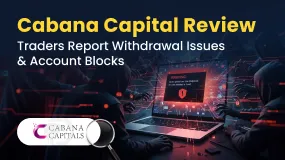Abstract:Beware of the rising 'investment scam' or 'pig butchering scam,' preying on students, homemakers, and job seekers, causing daily financial losses, warns Union Home Ministry.

A new and dangerous trend in cyber fraud is emerging, impacting vulnerable populations such as jobless youngsters, homemakers, students, and job seekers. This practice, often known as the “pig butchering scam” or the “investment scam,” is resulting in substantial financial losses throughout the world. According to the Union Home Ministry's most recent annual report, fraudsters are utilizing social media channels, including Google services, to spread these schemes.
The research explains how these crooks abuse weak people, taking advantage of their confidence and tricking them into losing enormous quantities of money. The fraud comprises phony investment possibilities, which are frequently tied to Bitcoin platforms, and it is becoming a major worry.
What is the Pig Butchery Scam?
The term “pig butchering” refers to the scammer's strategy of developing a connection with the victim, earning their confidence, and “fattening them up” financially before stealing their money. The scam usually includes cybercriminals claiming to be friendly or romantic individuals and getting victims to participate in phony Bitcoin schemes.
This fraud began in China in 2016 and has grown abroad, targeting individuals using social engineering tactics. Once a victim's confidence is developed, they are duped into making huge investments, only to find out too late that the platforms are fraudulent.
How Does the Scam Operate?
Scammers generally start by contacting people using popular platforms such as dating apps, social media, or messaging services like WhatsApp and LinkedIn. They create convincing profiles by acting as people with prosperous lifestyles and similar hobbies. They gradually build confidence by offering false success tales and personal experiences.
After gaining the victim's confidence, the fraudster introduces them to an “investment opportunity.” This generally involves a bogus Bitcoin site that promises the victim large rewards. To make the fraud appear authentic, the scammer may first permit minor withdrawals, giving the victim a false sense of security. However, as the victim spends additional money, frequently borrowing or draining their savings, the fraudster vanishes, leaving the victim unable to recover their losses.

Increasing Threat via Social Media
The emergence of social media platforms, particularly WhatsApp, has accelerated the spread of this fraud. According to the survey, fraudsters use these sites to promote unlawful lending applications and other fraudulent activities. In fact, WhatsApp has emerged as the most popular channel for cybercrime complaints in India, followed by Telegram, Instagram, and Facebook.
The study also emphasizes the involvement of major technology companies like as Google and Facebook, who have collaborated with the Indian Cyber Crime Coordination Centre (I4C) to address these risks proactively. They exchange intelligence and work together to take rapid action against cybercriminals.
Why Is the Scam So Effective?
The pig butchering hoax makes use of strong emotions including the desire for financial achievement, love, or the fear of missing out (FOMO). The scammers' manipulation skills are extremely effective because they make victims feel safe and assured in their financial decisions.
These fraudsters frequently employ professional-looking websites and interfaces, making their scams appear respectable and trustworthy. Victims frequently assume they are making smart financial decisions, unaware knowing they are being defrauded.
Red Flags:
Several warning flags might help you identify a pig slaughtering scam:
- Getting unwanted texts from strangers.
- Attempts to make a rapid personal or romantic connection.
- Claims of “guaranteed” great return on investment.
- Being steered to unfamiliar or unverified investing sites.
- Pressure to respond fast or raise investment quantities.
- If you observe any of these signals, you should proceed with care and avoid engaging with the individual or platform.
How to Protect Yourself
To avoid falling prey to the pig butchering hoax, you can take the following easy yet effective steps:
- Be wary of unwanted communications, particularly from strangers on social media or dating apps.
- Always conduct comprehensive and independent research on any investment possibility before investing money.
- Never give personal or financial information to someone you don't completely trust.
- Check the validity of any platform before investing, especially if you're unfamiliar with it.
- If you believe you have been targeted, report the fraud to your local cybercrime unit or utilize the National Cyber Crime Reporting Portal (cybercrime.gov.in).
- National Cybercrime Threat Analysis Unit
The National Cybercrime Threat Analytical Unit (NCTAU), a division of the I4C, is critical to countering cybercrime. It evaluates complaints made through the site and provides useful information to banks, payment platforms, e-commerce companies, and other stakeholders. These reports assist in recognizing new dangers and taking proactive steps to avoid fraud.
Cyber Volunteers
To address the rising threat of cybercrime, the ministry has established the Cyber Volunteer Framework. This campaign empowers individuals to become cyber volunteers, reporting illegal content and raising awareness about cyber hygiene. As of March 2024, more than 54,000 volunteers have enrolled, providing a major contribution to cyber fraud prevention.
Conclusion: Stay vigilant
The pig butchering fraud is a significant and widespread phenomenon that continues to harm people all over the world. Staying aware, detecting red signals, and taking care will help you avoid becoming a victim of this fraudulent scam. If you feel you have been targeted, do not hesitate to report it to the authorities.











